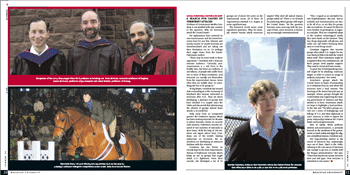Local/Regional Issues Are Key
 Professor of Government Martha Crenshaw is not satisfied with easy answers to the question, Why do terrorists attack the United States?
Professor of Government Martha Crenshaw is not satisfied with easy answers to the question, Why do terrorists attack the United States?
Pat explanations have centered on anti-Americanism and the hatred terrorists have for our free, tolerant, and secular society. Or maybe terrorists are disenfranchised and are taking out their frustration on us. Or perhaps their anger stems from the Israeli- Palestinian conflict.
“There may be some truth to these arguments,” Crenshaw told a Reunion seminar audience. “Certainly, anti- Americanism is a real force in the Middle East. But there are millions. if not billions, of people who suffer from one or more of these conditions. And terrorists are usually not themselves from the impoverished classes. More often they are middle class. So something else has to be going on.”
To dig deeper, Crenshaw has teamed with criminologists at the University of Maryland who became interested in terrorism after 9/11. They set about developing a database of groups that have attacked U.S. targets since the 1960s and discovered that determining the identity of groups behind these attacks is no small feat.
Help came from an unexpected quarter: the Pinkerton Agency, which has been tracking terrorists for decades to advise business clients on security risks overseas. Pinkerton’s records consisted of vast numbers of notecards in shoe boxes. With the help of 100 students and expert advice from Crenshaw, one of the world’s leading authorities on terrorism, the researchers are developing an extensive database with this material.
Crenshaw has also drawn on records kept by the State Department’s Bureau of Diplomatic Security, which keeps an eye on groups that might attack U.S. diplomats. From their records, she developed a list of 50 groups out of about 500 active on the international scene; all of these 50 organizations attacked U.S. targets in some significant way.
The historical record raises some significant questions. Why, for example, doesn’t Hamas attack American targets? Why don’t all radical Islamic groups attack us? There is no formula for predicting which groups will target the United States. Yet the question becomes more pressing with the passage of time, since terrorism is becoming increasingly internationalized.
“This I regard as an inevitable feature of globalization,” she said. “Just as mobility and communication are easier for all of us, so are they for groups who use violence. It’s easier for them to cross borders, to get weapons, to organize and plot. They are completely adept in the modern technological world; they raise funds on the Internet. They buy cheap disposable cell phones and make one call before throwing them away to avoid being traced.”
Crenshaw suggests that terrorist groups often attack U.S. targets for reasons that have little to do with the United States itself. Their motivation might be to appeal to their own constituencies. All these groups need popular support. They need to recruit and raise money.
“A good way of distinguishing yourself might be by attacking American targets in order to convey an image of audacity and power,” she noted.
Sometimes groups attack the United States in hopes of persuading us to withdraw from an area where the terrorists have a local interest. The bombing of the Beirut barracks was an example: Islamic groups thought the United States was supporting the existing government of Lebanon and they wanted us to leave. Sometimes attackers hope to highlight a local problem. In the ’60s and ’70s leftist groups carried out a series of kidnappings and killings of U.S. and other diplomats in Latin America in order to expose the proxy relationship between the United States and local governments.
Even al Qaeda, which professes extreme anti-Americanism, is primarily focused on the overthrow of the governments in Saudi Arabia and Egypt for religious and political reasons, Crenshaw said.
Her long-standing interest in the causes of terrorism was, surprisingly, once out of favor. “Back in the 1980s, referring to the root causes of terrorism was enough to get you in trouble with the Reagan administration,” she says. “Their view denied root causes; terrorists were just bad guys. Now everyone is interested in root causes.”
